Unveiling the Magical World of K-Pop: Get Ready to Dance to the Rhythm of South Korea!
In the past decade, a musical sensation has been sweeping the globe and capturing hearts of every corner and redefining the pop music. The miracle is none other than K-pop. What is K-pop you might ask. K-pop is increasingly than a genre; It is a tousle of music, dance, rap, visual and well-constructed awesomeness. Originating from the corners of South Korea, K-pop has the unshortened world by storm and we bet once you get the taste of it, you are hooked to it.
Table of Contents
What is K-pop?
K-pop, short for “Korean Pop” is a vibrant and dynamic music genre that originated in South Korea. It has emerged as a cultural phenomenon, captivating audiences worldwide with its infectious melodies, upper energy performances and visually well-flavored music videos. Vastitude its musical aspect, K-pop represents a well-constructed entertainment package, incorporating elaborate concepts, fashion-forward philosophy and captivating storytelling in its music video. The genre’s global request transcends language barriers, with many recent K-pop songs blending multilingual elements, permitting international fans to connect with the music and the artist. K-pop continues to evolve and innovate, solidifying its position as a dominant gravity in the global music industry.
What is K-pop Music?
Originating from South Korea, K-pop is a diverse and vibrant genre which encompasses a wide range of musical styles, including hip-hop, R&B, rock, verse etcetera. The roots of the K-pop can be traced when to 1950s. This is particularly a new genre and has begun gaining recognition in past few years. American pop music had a unconfined influence on the K-pop. Though, American pop and Korean pop is variegated in many ways the similarities are definitely there and till stage western music continues to influence the genre.
What is K-pop in Korean?
In Korean, K-pop is known as 대중음악 (daejungeumak), which translates to “popular music” or “mainstream music.” Its literal translation is pop music. It is a term used to describe music that is widely enjoyed and favoured by the unstipulated public. Just like in English, pop music in Korea encompasses a wholesale range of musical styles and genres that are popular among the masses, including pop, rock, hip-hop, R&B and more. 대중음악 (daejungeumak) is a term wontedly used in South Korea to describe trendy music that is widely listened and appreciated by the mass.
What is K-pop in Hangeul?
Before knowing what is K-pop in Hangeul, let’s just learn what is Hangeul. Hangeul, moreover known as Hangul, is the native writing system of the Korean language. It was created in the 15th century by the King Sejong the Unconfined and his scholars.
In Hangeul, K-pop is written as “케이팝” (keipap). It is the combination of two characters. “케이” (kei) and “팝” (pap). The first weft “케이” is the transliteration of the English alphabet “K”, while the second weft “팝” represents the English word “Pop.” When combined, these notation form “케이팝”, which is the Korean term for K-pop.
Characteristics of K-pop
K-pop makes its listeners groove to its beats but what are those magical characteristics of K-pop that make K-pop a genre like no other! Let’s explore!
- Catchy Melodies: K-pop songs are like earworms that get stuck into your throne for days. From unforgettable hooks to haunting choruses, these melodies are crafted to be unremittingly replayed, ensuring they leave a long-lasting impression on your heart.
- High-Energy Performances: While watching an act of K-pop unchangingly twosome yourself for heart pounding excitement! K-pop idols are nonpareil of talent and dedication, wowing regulars with their electrifying flit and energy packed performances. Don’t believe us? Then go and listen to a K-pop song and be prepared to groove to the beats and witness some jaw-dropping moves.
- Visual Appeal: K-pop music videos are nothing short of cinematic masterpieces. They are elaborate and visually stunning. They often full-length intricate sets, captivating storytelling and impressive special effects, enhancing the overall entertainment value of the song. While watching a music video be transported to dreamlike landscapes. The visuals will leave you in awe.
- Global Reach: K-pop knows no boundary! Its multilingual element, combined with the raw passion of the artists reaches to the international regulars as well, While, primarily the K-pop songs are in Korean language, many songs incorporate English lyrics or phrases, making them wieldy to international fans. In fact, recently many K-pop songs are entirely sung in English such as “Butter” by BTS and “The Feels” by TWICE. Many K-pop artists moreover interreact with international artists to reach to the international levels. Some of the famous collaboration washed-up by K-pop artists are collaboration of BLACKPINK with Selena Gomez and BTS with Halsey.
- Innovative Concepts: K-pop artists are known for their innovative and creative concepts. They often experiment with variegated themes, styles and visuals in their music videos and performances, keeping their regulars engaged and intrigued.
History of K-pop
K-pop, an synoptic form of Korean Pop traces when to its origin in 1990s. But how have K-pop evolved? To know the present, one has to swoop into its history so let’s embark on an heady journey of K-pop and explore its unobtrusive beginnings to global dominance.
- The roots of K-pop (1950s-1980s): K-pop’s roots can be traced when to 1950s when American troops stationed in South Korea brought with them the influence of western music. This laid the wiring of K-pop and artists began to tousle Korean traditional music with western music. A popular genre known as “Trot” rose during 1970s and 1980s. This genre was characterized by upbeat rhythms and emotional vocals.
- A Turning Point for K-pop (1990s): 1990s was the turning point for K-pop. During this decade the term K-pop was coined to refer to the burgeoning Korean music industry. Seo Taji and Boys, the legendary artists came into the scene during 1992. They used to tousle various music genres like hip-hop, R&B, waddle etcetera. Their music reverted the whole undertow of K-pop and sowed the seeds of modern K-pop music.
- The Rise of The First generation (Late 1990s-2000s): The first generation of K-pop idols such as S.E.S and H.O.T emerged during this period. These artists brought a fresh wave of dynamic energy and laid lanugo the foundation of idol culture.
- Hallyu Wave (2000s): K-pop started to go vastitude their confines specially to Japan and other Asian countries during the 2000s. BoA, a well-known K-pop idol, achieved massive success in Japan helping to spread the magic of K-pop internationally. Hallyu wave, which substantially ways global popularity and influence of Korean culture started to rise during the mid-2000s.
- The Second Wave and Worldwide Recognition (Late 2000s): In the second wave of global expansion artists such as Big Bang, Super Junior and Girl’s Generation etcetera gained huge popularity. K-pop’s soulful music, powerful choreography and splendid music videos were loved by the fans which helped in gaining international recognition.
- A Decade of Breakthrough (2010s): This decade took the unshortened world by storm as PSY’s “Gangnam Style” became the first K-pop song to unzip global mainstream success. This revolutionary moment paved the way for other K-pop idols to proceeds recognition internationally. Groups such as BLACKPINK, BTS, EXO, TWICE etcetera turned out to be a global sensation, garnering immense popularity and breaking records in international charts.
- Today’s K-pop: A Global Phenomenon: As we step into the 2020s, K-pop continues to thrive as a global phenomenon. The genre has diversified, bringing a wide range of musical styles and concepts. K-pop artists interreact with international artists, bridging cultures and creating music.
What was the First K-pop Group?
Seo Taiji and Boys is widely recognized as one of the primeval and most influential groups in the minutiae of what later became the K-pop genre. Seo Taiji, a South Korean singer and musician, worked the group Seo Taiji and Boys in 1992 withal with Lee Juno and Yang Hyun-suk. They revolutionized the music scene with their groundbreaking music, which composite elements of hip-hop, rap and R&B with Korean lyrics.

Their debut single, “Nan Arayo” which was released in 1992, marked a turning point in Korean music and it laid the foundation for today’s K-pop. Seo Taiji and Boys achieved immense popularity in South Korea with their rebellious and socially conscious music, addressing issues such as societal pressure. They disbanded in 1996.
While Seo Taiji and Boys were not debuted by a company, the legendary boy wreath H.O.T (High-five of Teenagers) was worked by SM Entertainment. Debuted on 7th September 1996, they quickly became a sensation in South Korea. Consisting of members Moon hee-Joon, Jang Woo-hyuk, Tony An, Kangta and Lee Jae-won, the group captured the hearts of the regulars with their fresh music. Their debut tome “We Hate All Kinds of Violence,” introduced a fresh and innovative music.
Both the groups were iconic in the history and they are still prestigious till stage and their contribution is truly praise worthy.
Who is a K-pop Idol?
A K-pop idols refers to a performer, typically a singer or dancer, who is a member of K-pop group or acts or as a solo versifier withing the K-pop music industry. These idols are known for their unrenowned talents, captivating performances and charismatic personalities which have earned them a massive fan pursuit not only in the South Korea but moreover worldwide.
K-pop idols undergo rigorous training in singing, dancing, rapping and sometimes vicarial and foreign languages as well, to strop their talents to wilt the weightier entertainers. The training period can vary and may take upto several years surpassing the trainees can debut.
Once an idol debuts, they wilt a part of a group or start their solo career, releasing music, performing in concerts and participating in various entertainment activities. These idols are unprofane by the fans, who are wontedly referred to as “Fandoms.” Fandoms plays an essential role in supporting their favourite idols and each idols have their separate fandoms like BTS have Army, BLACKPINK have Blink, TWICE have Once etc.
Popular K-pop Groups and Solo Artists
In South Korea, every year thousands of trainees debut but only few are those lucky ones to proceeds success and popularity. It is moreover very worldwide for the K-pop groups to disband and pursue their solo career when their contract expires until and unless they renew it. If a group can protract for a decade, it is said they have gained a new level of victory considering it is very rare.
There are many K-pop groups in the history but we have handpicked the weightier K-pop groups which we are sure everyone will enjoy!
Famous K-pop Girl groups
Get ready to be enchanted by the powerhouse divas of K-pop! From captivating performances to infectious melodies, K-pop girl groups have taken the unshortened world by the storm with their immense talent and charm. With each member bringing their unique flair and charisma to the stage, these girl groups have wilt cultural icons and trailblazers in the industry. Let’s have a squint on the most famous girl groups in the history.
Girls’ Generation (SNSD)

Debut Date: August 5, 2007
Members: Taeyeon, Sunny, Tiffany, Hyoyeon, Yuri, Sooyoung, Yoona, Seohyun, Jessica (until 2014)
Must-Listen Songs: “Gee,” “Genie,” “The Boys,” “I Got A Boy”
2NE1

Debut Date: May 6, 2009
Members: CL, Dara, Park Bom, Minzy
Must-Listen Songs: “I Am The Best,” “Lonely,” “Fire,” “Come When Home”
BLACKPINK

Debut Date: August 8, 2016
Members: Jennie, Lisa, Rosé, Jisoo
Must-Listen Songs: “DDU-DU DDU-DU,” “Kill This Love,” “How You Like That”
TWICE

Debut Date: October 20, 2015
Members: Nayeon, Jeongyeon, Momo, Sana, Jihyo, Mina, Dahyun, Chaeyoung, Tzuyu
Must-Listen Songs: “TT,” “Fancy,” “Feel Special”
Red Velvet

Debut Date: August 1, 2014
Members: Irene, Seulgi, Wendy, Joy, Yeri
Must-Listen Songs: “Red Flavor,” “Psycho,” “Bad Boy”
MAMAMOO

Debut Date: June 18, 2014
Members: Solar, Moonbyul, Wheein, Hwasa
Must-Listen Songs: “Starry Night,” “HIP,” “Egotistic”
GFRIEND

Debut Date: January 16, 2015
Members: Sowon, Yerin, Eunha, Yuju, SinB, Umji
Must-Listen Songs: “Rough,” “Navillera,” “Time for the Moon Night”
ITZY

Debut Date: February 12, 2019
Members: Yeji, Lia, Ryujin, Chaeryeong, Yuna
Must-Listen Songs: “Dalla Dalla,” “Wannabe,” “Not Shy”
Apink
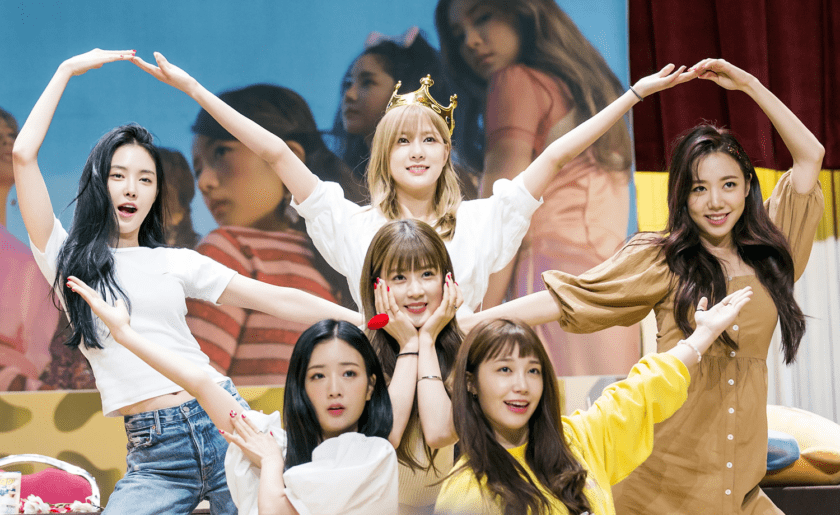
Debut Date: April 19, 2011
Members: Chorong, Bomi, Eunji, Naeun, Namjoo, Hayoung
Must-Listen Songs: “NoNoNo,” “LUV,” “Dumhdurum”
EVERGLOW

Debut Date: March 18, 2019
Members: E:U, Sihyeon, Mia, Onda, Aisha, Yiren
Must-Listen Songs: “Bon Bon Chocolat,” “DUN DUN,” “La Di Da”
MOMOLAND
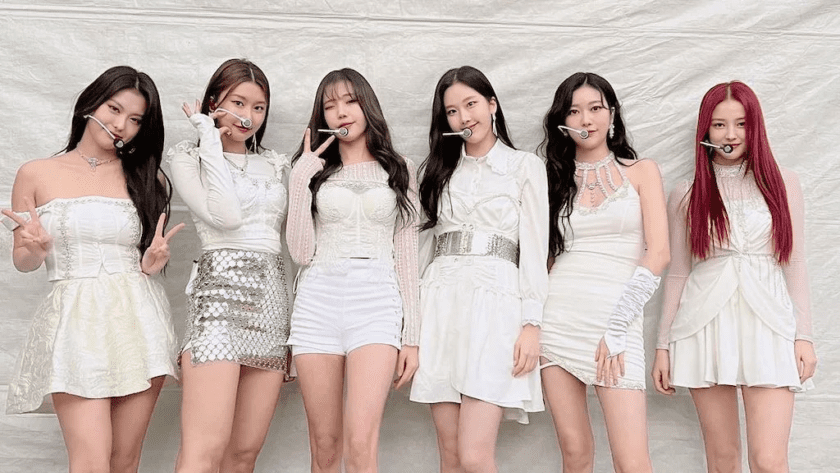
Debut Date: November 10, 2016
Members: Hyebin, Jane, Nayun, JooE, Ahin, Nancy, Daisy, Taeha, Yeonwoo (Some members have departed from the group)
Must-Listen Songs: “BBoom BBoom,” “BAAM,” “Thumbs Up”
(G)I-DLE

Debut Date: May 2, 2018
Members: Soyeon, Miyeon, Minnie, Soojin, Yuqi, Shuhua
Must-Listen Songs: “LATATA,” “Oh my god,” “DUMDi DUMDi”
These girl groups have made a significant impact on the K-Pop industry and have garnered a massive pursuit both in South Korea and virtually the world. Each group brings its unique style and recreate to the stage, showcasing the diversity and talent within the K-Pop girl group scene.
Famous K-pop Boy Groups
Get ready to be squandered yonder by the electrifying talents of K-Pop’s iconic boy groups! From soul-stirring vocals to mind-blowing flit moves, these dynamic performers have taken the world by storm with their chart-topping hits and scenic stage presence. From the trailblazing success of BTS to the suave charisma of EXO and the trendsetting vibes of NCT, these legendary boy groups have left an indelible mark on the global music scene.
We have curated the perfect list for you to explore the music of K-pop boy groups
BTS

Debut Date: June 13, 2013
Members: RM, Jin, Suga, J-Hope, Jimin, V, Jungkook
Notable Songs: “DNA,” “Fake Love,” “Boy With Luv,” “Dynamite,” “Butter”
EXO
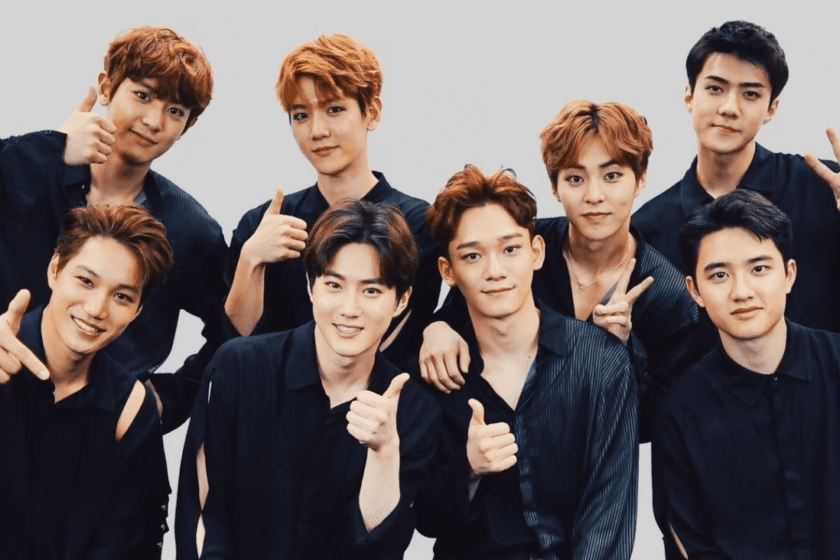
Debut Date: April 8, 2012
Members: Xiumin, Suho, Lay, Baekhyun, Chen, Chanyeol, D.O., Kai, Sehun
Notable Songs: “Growl,” “Call Me Baby,” “Love Shot,” “Obsession”
SHINee
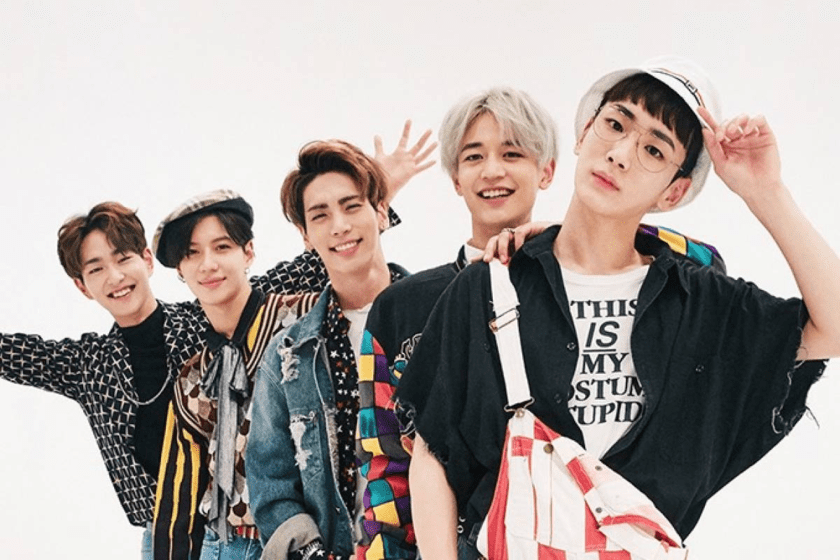
Debut Date: May 25, 2008
Members: Onew, Key, Minho, Taemin (Jonghyun was a member until December 2017 when he passed away)
Notable Songs: “Replay,” “Ring Ding Dong,” “Lucifer,” “Sherlock,” “View”
SEVENTEEN
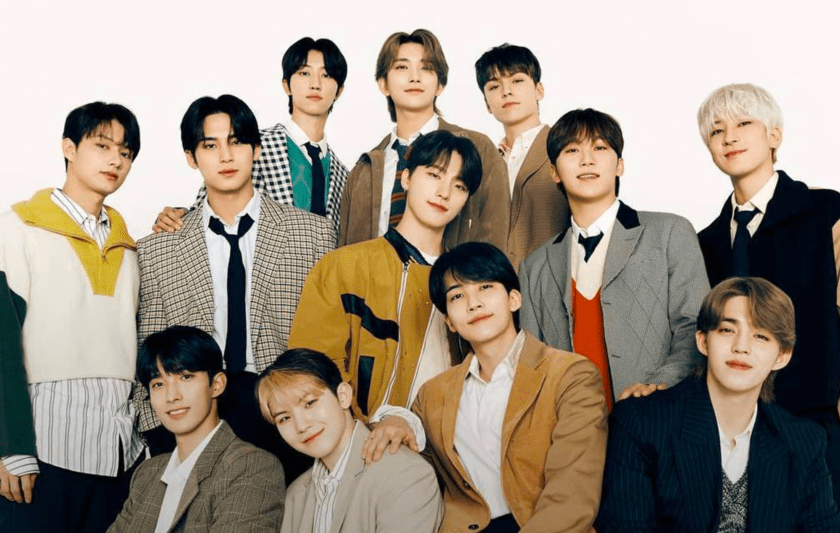
Debut Date: May 26, 2015
Members: S.Coups, Jeonghan, Joshua, Jun, Hoshi, Wonwoo, Woozi, DK, Mingyu, The8, Seungkwan, Vernon, Dino
Notable Songs: “Very Nice,” “Don’t Wanna Cry,” “Left & Right,” “HOME;RUN”
GOT7
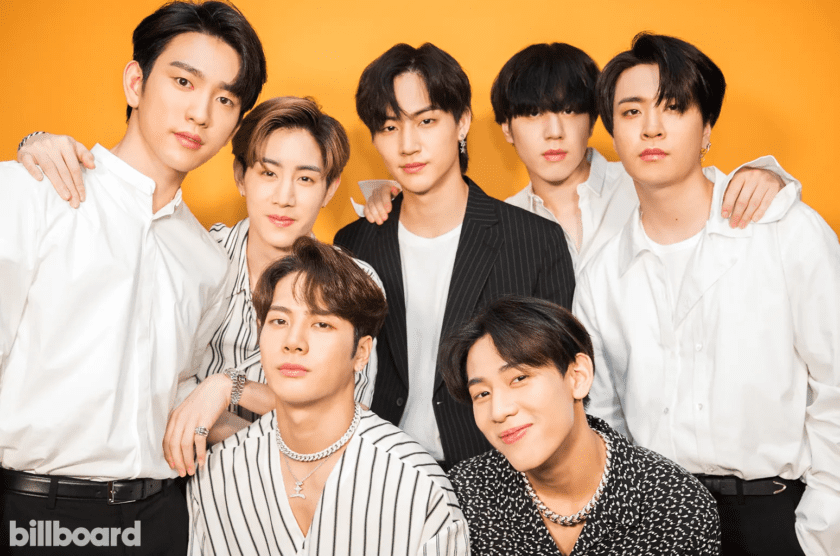
Debut Date: January 16, 2014
Members: JB, Mark, Jackson, Jinyoung, Youngjae, BamBam, Yugyeom
Notable Songs: “Just Right,” “Hard Carry,” “Lullaby,” “Breath”
Stray Kids

Debut Date: March 25, 2018
Members: Bang Chan, Lee Know, Changbin, Hyunjin, Han, Felix, Seungmin, I.N
Notable Songs: “Hellevator,” “God’s Menu,” “Back Door,” “MIROH”
Monsta X
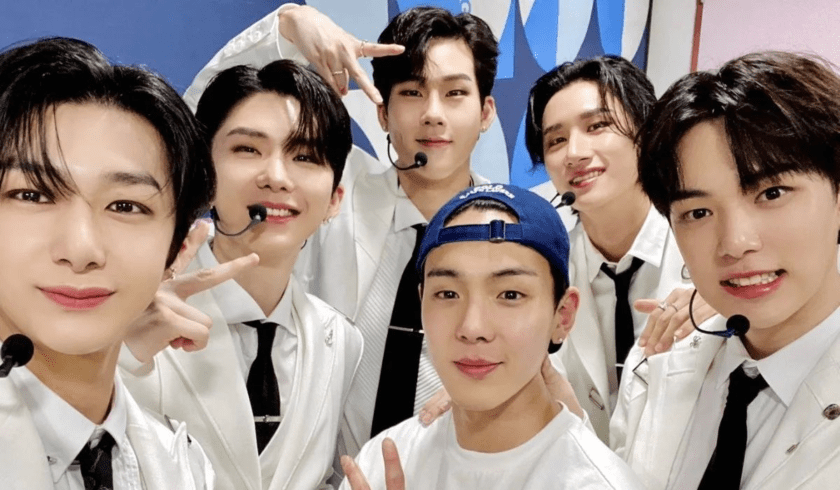
Debut Date: May 14, 2015
Members: Shownu, Minhyuk, Kihyun, Hyungwon, Joohoney (formerly known as Jooheon), I.M
Notable Songs: “Alligator,” “Shoot Out,” “Fantasia,” “GAMBLER”
ATEEZ
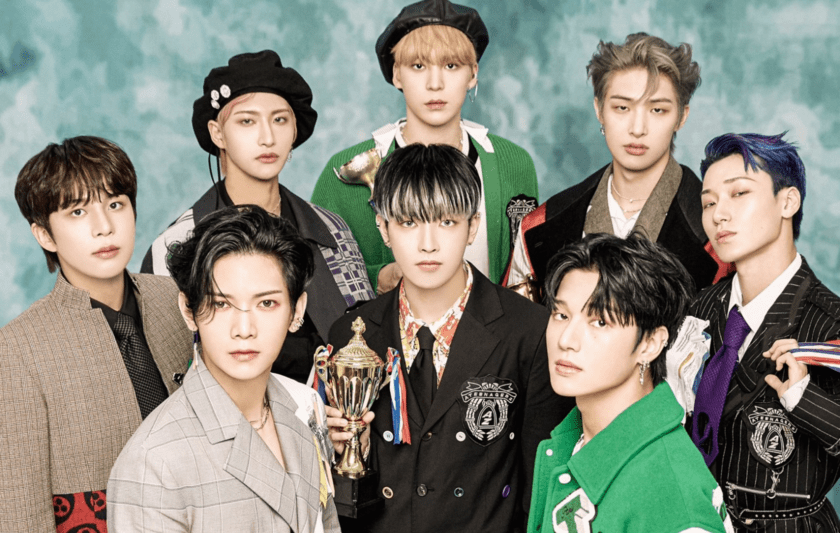
Debut Date: October 24, 2018
Members: Hongjoong, Seonghwa, Yunho, Yeosang, San, Mingi, Wooyoung, Jongho
Notable Songs: “Say My Name,” “Inception,” “Fireworks (I’m The One),” “Deja Vu”
Super Junior

Debut Date: November 6, 2005
Members: Leeteuk, Heechul, Yesung, Shindong, Eunhyuk, Siwon, Donghae, Ryeowook, Kyuhyun
Notable Songs: “Sorry, Sorry,” “Mr. Simple,” “Bonamana,” “Mamacita”
TXT (TOMORROW X TOGETHER)
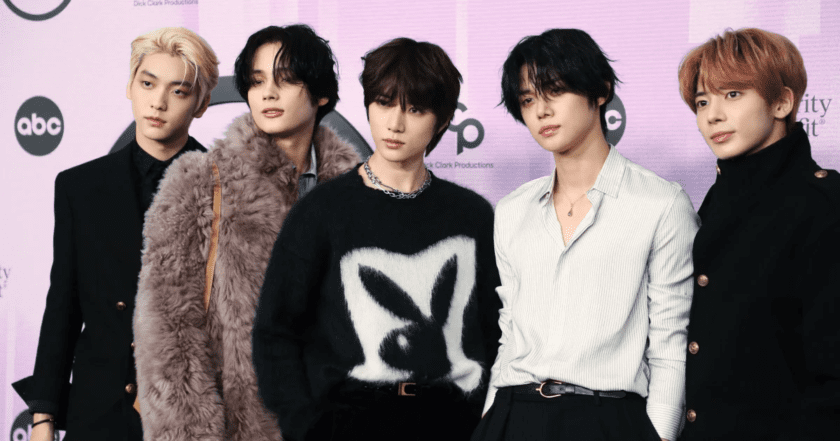
Debut Date: March 4, 2019
Members: Soobin, Yeonjun, Beomgyu, Taehyun, Huening Kai
Notable Songs: “CROWN,” “Run Away,” “Blue Hour,” “0X1=LOVESONG”
These boy groups have delivered a variety of hit songs that have resonated with fans all over the world, solidifying their status as global K-Pop icons.
Famous K-pop Solo Artists
Now, lets have some squint at the solo K-pop idols who you must listen to!
IU

Debut Date: September 18, 2008
Notable Songs: “Good Day,” “Palette,” “Blueming,” “Eight” (with SUGA), “Celebrity”
Taemin (SHINee)

Debut Date: August 18, 2014
Notable Songs: “Danger,” “Move,” “Criminal,” “Want,” “Advice”
Sunmi

Debut Date: February 17, 2014
Notable Songs: “24 Hours,” “Gashina,” “Heroine,” “Siren,” “TAIL”
Eric Nam

Debut Date: January 23, 2013
Notable Songs: “Heaven’s Door,” “Honestly,” “Runaway,” “Paradise”
Chungha

Debut Date: June 7, 2017
Notable Songs: “Why Don’t You Know,” “Roller Coaster,” “Gotta Go,” “Stay Tonight”
Zico (Block B)

Debut Date: November 7, 2014
Notable Songs: “Boys and Girls,” “I Am You, You Are Me,” “Any Song,” “Artist”
Heize

Debut Date: March 21, 2014
Notable Songs: “Don’t Know You,” “You, Clouds, Rain,” “Star,” “Happen”
Baekhyun (EXO)
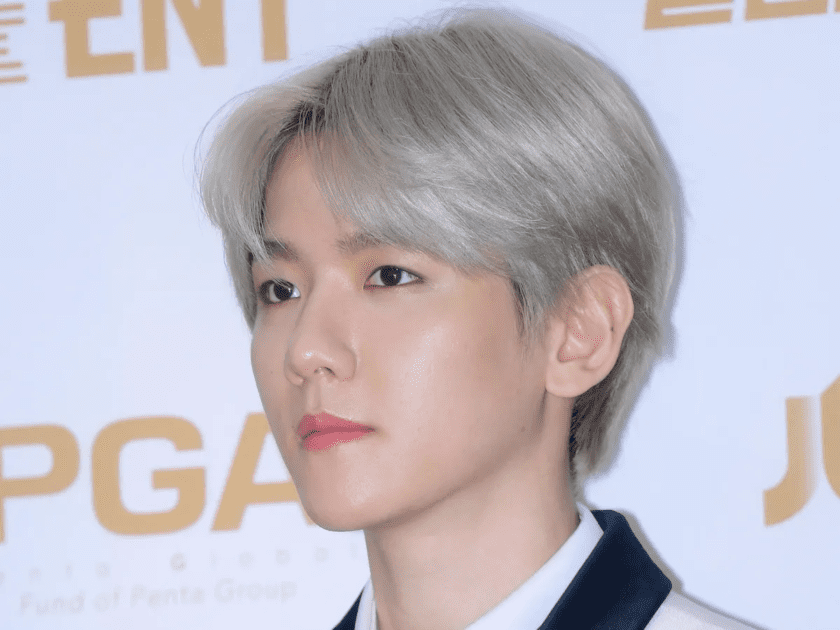
Debut Date: July 10, 2019
Notable Songs: “UN Village,” “Candy,” “Bambi,” “Get You Alone”
Agust D (SUGA of BTS)

Debut Date: August 16, 2016
Notable Songs: “Agust D,” “Daechwita,” “Burn It” (with MAX), “What Do You Think?”
Dean

Debut Date: July 17, 2015
Notable Songs: “Pour Up,” “D (Half Moon)” (with Gaeko), “Instagram,” “love”
Hwasa (MAMAMOO)

Debut Date: February 13, 2019
Notable Songs: “Twit,” “Maria,” “LMM,” “I’m Bad Too”
Jackson Wang (GOT7)

Debut Date: March 24, 2017
Notable Songs: “Papillon,” “Okay,” “100 Ways,” “LMLY” (with Galantis)
Taeyeon (Girls’ Generation)

Debut Date: October 7, 2015
Notable Songs: “I,” “Rain,” “Fine,” “Four Seasons”
Kang Daniel

Debut Date: July 25, 2019
Notable Songs: “What Are You Up To,” “TOUCHIN’,” “PARANOIA,” “Antidote”
HyunA

Debut Date: January 4, 2010 (as a solo artist; she was previously a member of 4Minute)
Notable Songs: “Change,” “Bubble Pop!,” “RED,” “I’m Not Cool”
One (Jung Jaewon)

Debut Date: July 11, 2017
Notable Songs: “Gettin’ by,” “Heyahe,” “Stone”
Kim Chungha

Debut Date: June 7, 2017
Notable Songs: “Why Don’t You Know,” “Roller Coaster,” “Stay Tonight,” “Bicycle”
G-Dragon (BIGBANG)

Debut Date: August 18, 2009 (as a solo artist; he was previously a member of BIGBANG)
Notable Songs: “Heartbreaker,” “Crooked,” “Untitled, 2014,” “Who You?”
Tiffany Young (Girls’ Generation)

Debut Date: May 31, 2016
Notable Songs: “Over My Skin,” “Teach You,” “Magnetic Moon”
Lee Hi

Debut Date: March 7, 2013
Notable Songs: “1, 2, 3, 4,” “Breathe,” “HOLO,” “My Love”
PSY

Debut Date: January 7, 2001 (as a solo artist; he was previously a member of the group “National Kid”)
Notable Songs: “Gangnam Style,” “Gentleman,” “New Face”
These solo artists have made significant contributions to the K-Pop industry and have garnered a strong pursuit for their outstanding talents and music. Each of them brings their unique artistry and flair to their solo work, proving their versatility and charisma as individual performers.
What has made K-pop so popular?
In the recent decade K-pop has taken the world by storm. It has given the message successfully that music does not follow any language and you only need soul and heart to enjoy it. But what are the factors which have unsalaried to make K-pop a worldwide phenomenon? Let’s go through them!
- Talented and Well-Trained Artists: K-Pop idols undergo rigorous training in singing, dancing, and performance skills surpassing their debut. This training, sometimes spanning years, results in polished and skilled performers who unhook impressive live stages and captivating entertainment.
- Active Social Media Presence: K-Pop agencies and idols maintain zippy social media presence, interacting directly with fans, sharing behind-the-scenes content, and participating in online challenges, which fosters a strong sense of polity and engagement among fans.
- Catchy Music and Unique Concepts: K-Pop often features tricky and upbeat music with haunting choruses that resonate with listeners. The genre is known for its diverse and innovative concepts, captivating audiences with visually stunning music videos and imaginative storytelling.
- High-Quality Production: K-Pop agencies invest heavily in production values, ensuring top-notch music videos, visually well-flavored tome packaging, and overall high-quality content that appeals to global audiences.
- Engaging Performances: K-Pop groups are known for their elaborate and synchronized flit routines, visually stunning stage productions, and engaging fan interactions during concerts and events. These captivating performances leave a lasting impact on fans.
- Diverse Representation: K-Pop groups often full-length diverse members from variegated countries, making it easier for international fans to relate to and support the idols who share similar backgrounds.
- Globalization and Internet Connectivity: The internet has played a significant role in the spread of K-Pop worldwide. Social media platforms, streaming services, and fan-driven websites enable international fans to wangle K-Pop content easily.
- Multilingual and Multicultural Appeal: K-Pop groups often release music in multiple languages, including English, making it wieldy to a broader audience. Additionally, K-Pop’s tousle of Korean and Western pop influences makes it well-flavored to diverse cultural backgrounds.
- Inclusive Fan Culture: K-Pop fans, known as “fandoms,” have a strong sense of polity and urgently support their favourite groups through fan projects, fan art, and streaming campaigns. This inclusive and passionate fan culture has helped K-Pop grow on the global stage.
- Innovative Marketing Strategies: K-Pop agencies employ innovative marketing strategies, such as reality shows, survival competitions, and fan-voted awards, to promote their artists and create a sense of excitement and engagement.
The combination of these factors has led to the exponential growth of K-Pop’s popularity worldwide, establishing it as a global cultural phenomenon.
Are you bored without reading so much? Here is a list of recommended K-pop songs for you to get refreshed again!
- BTS – “Dynamite”
- BLACKPINK – “DDU-DU DDU-DU”
- EXO – “Love Shot”
- TWICE – “Fancy”
- BIGBANG – “Fantastic Baby”
- Red Velvet – “Psycho”
- GOT7 – “Lullaby”
- IU – “Blueming”
- SEVENTEEN – “Don’t Wanna Cry”
- NCT U – “The 7th Sense”
- ITZY – “Wannabe”
- Taemin – “Move”
- (G)I-DLE – “Latata”
- Stray Kids – “God’s Menu”
- MAMAMOO – “HIP”
- Wanna One – “Energetic”
- MOMOLAND – “BBoom BBoom”
- Sunmi – “Gashina”
- MONSTA X – “Shoot Out”
- ATEEZ – “Say My Name”
K-pop in Television
K-pop, in the west has not only made its way to the ribbon shows, reality shows and of undertow to the hearts of the people but has moreover made its way to television shows which has popularized K-pop in western countries
- “Glee”: The popular musical TV series “Glee” featured several K-Pop songs in its episodes. In Season 4, the notation performed PSY’s “Gangnam Style,” and in Season 5, they covered Girls’ Generation’s “Gee” and “I Got A Boy.”
- “Superstore”: The sitcom “Superstore” included a funny scene in which the employees danced to BTS’s “Boy With Luv” during a store event, showcasing the song’s tricky flit moves and international appeal.
- “The Ellen DeGeneres Show”: BTS made appearances on “The Ellen DeGeneres Show” and performed their hit songs “IDOL” and “MIC Drop.” These performances introduced BTS and K-Pop to a broader Western audience.
- “Lucifer”: In an episode of “Lucifer,” the weft Ella Lopez, played by Aimee Garcia, danced and sang withal to BLACKPINK’s “Kill This Love,” showcasing the song’s global popularity.
- “Dancing with the Stars”: On the flit competition show “Dancing with the Stars,” contestants have performed routines to K-Pop songs, bringing the genre’s energetic and dynamic flit style to a broader audience.
- “Good Girls”: The crime-comedy series “Good Girls” featured a scene where the notation danced to BLACKPINK’s “Ddu-Du Ddu-Du” during a heist preparation, subtracting a touch of K-Pop to the show’s plot.
- “Zoey’s Extraordinary Playlist”: The musical comedy-drama “Zoey’s Extraordinary Playlist” incorporated a flit sequence set to NCT U’s “Make A Wish (Birthday Song),” showcasing the group’s powerful choreography.
- IDOL Series: Jennie, a member of BLACKPINK made her vicarial debut with the IDOL Series which recently premiered on June 4, 2023.
These instances reflect the growing recognition of K-Pop in Western entertainment and its influence on diverse TV shows. By featuring K-Pop songs in their episodes, Western shows not only entertain their audiences but moreover gloat the global request of K-Pop and its worthiness to connect with people from various cultures virtually the world.
What is Hallyu Wave and how is it related to K-pop?
Hallyu, moreover known as the “Korean Wave,” refers to the global spread of South Korean culture, including music, television dramas, movies, fashion, and more. It is a cultural miracle that gained momentum in the late 1990s and has unfurled to grow in influence over the years. Hallyu represents the increasing popularity and appreciation of Korean cultural content vastitude South Korea’s borders, reaching audiences virtually the world.
K-Pop, short for Korean Pop music, is one of the most prominent aspects of the Hallyu wave. It has played a pivotal role in spreading Korean culture and entertainment globally. K-Pop is characterized by its tricky and infectious music, impressive flit performances, visually stunning music videos, and captivating stage presence.
Here’s how K-Pop is related to the Hallyu wave
- Global Reach: K-Pop artists have expanded their reach to international audiences through social media, online platforms, and international concerts and tours. This has led to an ever-growing fanbase of diverse cultures and nationalities, contributing to the spread of Hallyu.
- Cultural Exchange: K-Pop often incorporates elements of Korean culture, traditions, and language, permitting international fans to wits and fathom Korean heritage through music and visuals. This cultural representation fosters cross-cultural mart and understanding.
- Fan Engagement: The dedication of K-Pop fans, known as “fandoms,” in promoting their favourite artists on social media, organizing fan events, and supporting international releases, has been instrumental in amplifying the Hallyu wave’s impact.
- International Collaborations: K-Pop artists interreact with international artists, participate in Western ribbon shows, and release music in multiple languages, remoter solidifying their position in the global music scene and contributing to the Hallyu wave’s expansion.
- Korean Drama and Entertainment: Besides K-Pop, Korean dramas and variety shows have moreover played a significant role in the Hallyu wave. Dramas with compelling storylines, relatable characters, and cultural elements have captured the hearts of viewers worldwide, encouraging them to explore increasingly of Korean entertainment.
- Tourism and Cultural Interest: The Hallyu wave has piqued the interest of people from virtually the world in Korean culture, leading to an increase in tourism to South Korea and the establishment of cultural mart programs.
- Soft Power Diplomacy: The South Korean government has recognized the potential of the Hallyu wave as a form of soft power, using cultural affairs to modernize the country’s global image and strengthen international relations.
Overall, K-Pop’s global popularity and influence have played a significant role in propelling the Hallyu wave to new heights, making Korean culture and entertainment a prominent part of the global cultural landscape. As the Hallyu wave continues to evolve, K-Pop remains at the forefront, captivating audiences and fostering a sense of cultural appreciation and connectivity worldwide.
How to wilt a K-pop idol?
Becoming a K-Pop idol is a challenging and highly competitive process that requires dedication, talent, training, and perseverance. Here are some steps to help you pursue a career as a K-Pop idol:
- Train in Singing, Dancing, and Performance: Start by honing your skills in singing, dancing, and performance. Take vocal and flit lessons from reputable instructors and practice regularly to modernize your abilities.
- Learn Korean Language and Culture: Since K-Pop is primarily conducted in Korean, it’s essential to learn the language to communicate powerfully and understand the lyrics. Additionally, familiarize yourself with Korean culture, customs, and traditions.
- Join a Talent Agency: Research and wield to reputable talent agencies in South Korea known for producing K-Pop idols. Some well-known agencies include SM Entertainment, YG Entertainment, JYP Entertainment, Big Hit Entertainment (now HYBE Corporation), and more.
- Audition for the Agency: Attend auditions organized by the talent agencies or submit online applications and video auditions. The hearing process typically involves showcasing your singing, dancing, and sometimes vicarial skills.
- Training Period: If you pass the audition, you’ll enter a training program with the agency. The training period can vary from several months to years, during which you’ll receive rigorous training in singing, dancing, acting, language, and overall performance.
- Maintain Physical and Mental Health: K-Pop idols undergo intense schedules and performances, so it’s crucial to maintain physical fitness and prioritize mental well-being throughout your training and career.
- Showcase Your Individuality: Stand out from other trainees by showcasing your unique talents and individuality. Be yourself and bring your own recreate to your performances.
- Participate in Talent Shows and Competitions: Participate in talent shows and competitions to proceeds exposure and wits in performing in front of an audience.
- Be Persistent and Resilient: The path to rhadamanthine a K-Pop idol can be challenging, with many rejections and setbacks. Stay determined, practice continuously, and be resilient in the squatter of obstacles.
- Be Unshut to Opportunities: While aiming to wilt a K-Pop idol, be unshut to other opportunities in the entertainment industry, such as vicarial or hosting, as these experiences can moreover help you grow as an artist.
Remember that rhadamanthine a K-Pop idol requires nonflexible work, dedication, and a bit of luck. It’s essential to be realistic well-nigh the challenges and uncertainties that come with pursuing a career in the entertainment.
How to get into K-pop?
If you want to wilt a fan of K-Pop and immerse yourself in the captivating world of Korean music and entertainment, here are some steps to get started:
- Explore K-Pop Groups and Solo Artists: Begin your K-Pop journey by exploring variegated K-Pop groups and solo artists. Listen to their music, watch their music videos, and get to know their unique styles and concepts.
- Discover Iconic Songs and MVs: Check out some of the most iconic K-Pop songs and music videos that have left a significant impact on the industry. This will requite you a taste of the diverse genres and visual storytelling in K-Pop.
- Watch Variety Shows and Interviews: Many K-Pop groups and artists towards on Korean variety shows and interviews. These shows provide insights into their personalities, camaraderie, and fun interactions, giving you a glimpse into the artists overdue the performances.
- Follow K-Pop News and Updates: Stay up-to-date with the latest news and updates in the K-Pop world. Follow fan accounts, entertainment news sites, and official social media pages of your favourite groups to be informed well-nigh their activities.
- Join K-Pop Communities and Fandoms: Engage with other K-Pop fans by joining online communities and fandoms. Participate in discussions, fan projects, and share your love for K-Pop with like-minded individuals.
- Learn the Fanchants: Fanchants are fan chants that fans perform during live performances to cheer on their favorite idols. Learning the fanchants adds to the excitement of watching performances and helps you connect with the fandom.
- Support Your Bias and Group: In K-Pop, a “bias” is your favourite member of a group. Show your support for your bias and the group by streaming their music, voting in polls, and participating in fan events.
- Enjoy K-Dramas and Variety Shows: Vastitude music, explore Korean dramas and variety shows. Many K-Pop idols moreover towards in dramas and variety programs, which allows you to see them in variegated roles.
- Be Respectful and Supportive: Respect the artists, their privacy, and fellow fans. Engage in positive discussions and contribute to creating a supportive and enjoyable fandom culture.
Remember that stuff a fan of K-Pop is all well-nigh enjoying the music, performances, and the sense of polity that comes with stuff part of a fandom. Embrace the fun, excitement, and passion that K-Pop brings and join the millions of fans virtually the world who have fallen in love with this dynamic and global phenomenon.
K-pop is surely a global miracle which defies all limits and currently one of most popular genres. With the help of this article, we hope you will enjoy your journey of rhadamanthine a K-pop stan and still if you are not convinced you are surely gonna miss out on so many happening things. So, go and swoop into the magical world of K-pop which is waiting for you with its unshut arms!






.jpg)